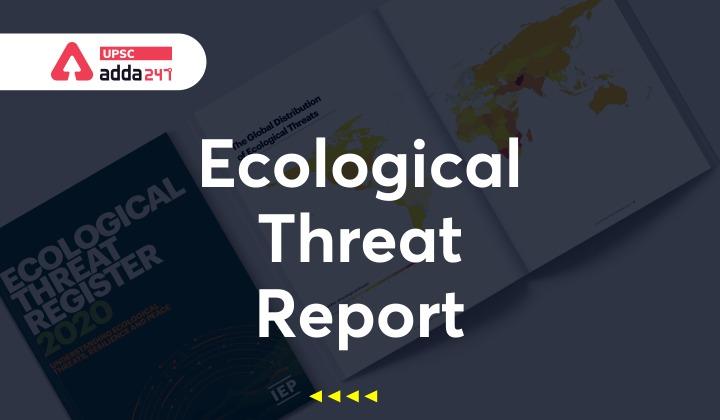Table of Contents
Ecological Threat Report 2021: Relevance
- GS 3: Conservation, environmental pollution and degradation, environmental impact assessment.
Ecological Threat Report 2021: Context
- Recently, the second edition of Ecological Threat Register Report released by Institute of Economics and Peace where it has alarmed that 1.26 billion people are at the highest risk of conflict and displacement caused by environmental damage.
Ecological Threat Report 2021: Key points
- At the US Virtual Launch of the Ecological Threat Register 2021 (ETR), the report’s main findings were shared and practical steps for improving global governance in support for the most ecologically vulnerable nations were discussed.
Ecological Threat Report 2021: Key findings
Conflict and ecological threats
- The main finding from the report is that a cyclic relationship exists between ecological degradation and conflict.
- It is a vicious cycle, whereby degradation of resources leads to conflict, leading to further resource degradation.
- Eleven of 15 countries with the worst environmental threat scores are currently classified as being in conflict.
- Another four are classified as at high risk of substantial falls in peace, highlighting the relationship between resource degradation and conflict.
National Environmental Engineering Research Institute (NEERI)
Ecological threat and migration
- The Ecological Threat Report 2021 has found that more than 1.26 billion people live in 30 hotspot countries, suffering from both extreme ecological risk and low levels of resilience.
- These countries are least likely to be able to mitigate and adapt to new ecological threats, which is likely to cause mass displacement.
- COVID-19 has increased food insecurity and prevented refugees from returning home.
High Ambition Coalition (HAC) for Nature and People
Attitudes towards climate change
- The most significant emitters of carbon dioxide are countries where their citizens are least concerned with climate change. They are also some of the most populous countries in the world.
- Only 23% of China’s citizens see climate change as a very serious threat, while India recorded only 35%.

Food insecurity
- Since 2014, the number of people without access to adequate food globally has risen every year, increasing by 44%. Increases in food insecurity are associated with deteriorations in peace.
- By 2050, the global demand for food is expected to increase by 50%.
IPCC report’s Sixth Assessment Report
Water stress
- The Ecological Threat Register Report reveals that by 2040 over 5.4 billion people will live in countries facing extreme water stress.
- 70% of the Sub-Saharan African population suffer from inadequate access to safely managed water, which will be compounded by high population growth.
Building ecological resilience
- Develop policy recommendations, including health, food, water, refugee relief, finance, agricultural management that promote global ecological resilience.
- Although military interventions are necessary, they will not solve the underlying ecological issues driving the conflicts.
- The lesson from Afghanistan is that without well planned and executed development spending, obtaining peace is impossible.
- With conflict having cost the global economy $600 billion in 2020, the Ecological Threat Register Report shows that COP26 negotiations need to approve resilience funding to ecological hotspots before drivers of conflict intensify.



 TSPSC Group 1 Question Paper 2024, Downl...
TSPSC Group 1 Question Paper 2024, Downl...
 TSPSC Group 1 Answer key 2024 Out, Downl...
TSPSC Group 1 Answer key 2024 Out, Downl...
 Cabinet Ministers of India 2024, New Cab...
Cabinet Ministers of India 2024, New Cab...







